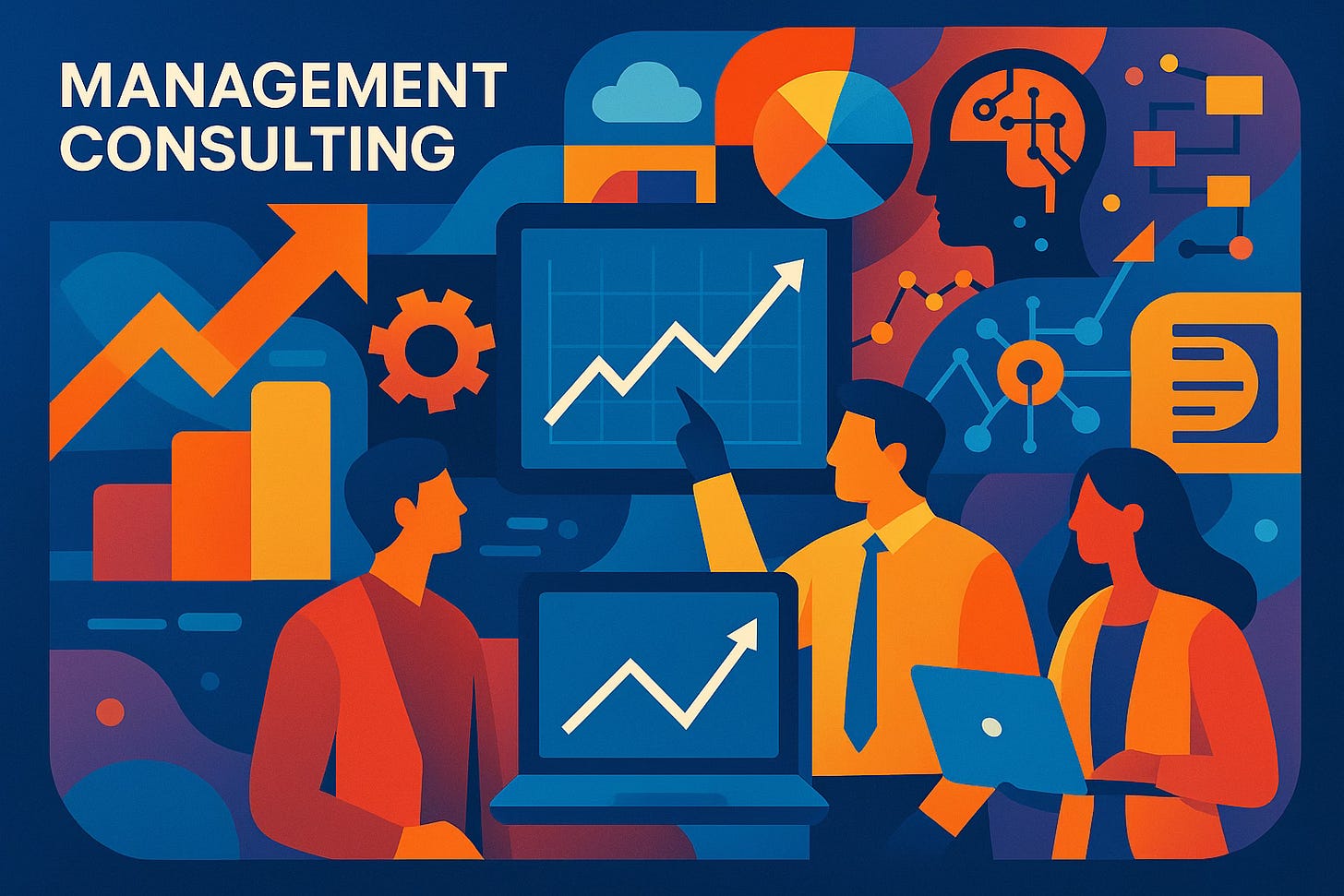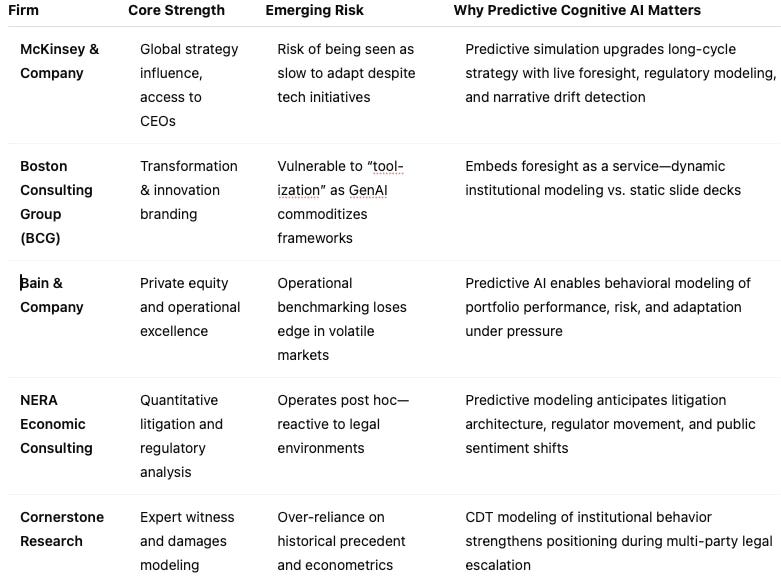MCAI Innovation Vision: Rebuilding Consulting in the Age of Predictive Cognitive AI
A Strategic Foresight Agenda for Consulting Firms Navigating AI, Institutional Complexity, and the Collapse of Static Advice
See other MindCast AI publications on AI industry management consulting.
Socrates on AI, A Vision Statement for Intelligence Worth Finding (Aug 2025),
Marcus Aurelius on AI, Meditations on Success, Valuation, and Market Discipline (Aug 2025),
Trust as AI Infrastructure, How Economists Explain the Invisible Foundation of Today’s AI Market (Aug 2025).
The consulting industry is at a crossroads. As generative AI and autonomous agents redefine how knowledge is accessed, synthesized, and operationalized, consulting firms must transform—not by adopting AI as a tool, but by rearchitecting their business models around predictive cognitive intelligence.
For decades, firms like McKinsey, BCG, and NERA have built their reputations on human capital, strategy synthesis, and elegant storytelling. But AI is no longer a background tool. It is now a co-pilot, a collaborator, and increasingly, a competitor.
I. AI Must Be Built Into the Firm—Not Just Used By the Firm
Deploying thousands of AI agents to assist with slides, research, or arguments is not transformation—it’s augmentation. True leadership requires integrating AI into the core operating model, reshaping:
Staffing ratios and junior roles
Client billing and outcomes-based pricing
Internal knowledge loops and foresight cycles
McKinsey’s move to deploy 12,000 agents and cut 5,000 jobs is not a cost play—it’s a signal. The firm of the future will be leaner, faster, and natively AI-literate.
Contact mcai@mindcast-ai.com to partner with us on foresight simulations in law and economics, legacy innovation and AI innovation.
II. Consulting Clients Are No Longer Buying Answers—They’re Buying Change
The role of consulting is evolving as client environments become more dynamic and less tolerant of lagging insight. In a world of overlapping regulatory pressure, reputational risk, and rapid narrative cycles, firms increasingly seek not static deliverables but adaptive, ongoing support.
While some clients will still expect clear answers, more are now asking: How will this strategy hold up under future stress? What are the second- and third-order effects of this decision? How will stakeholders react when external conditions change?
To serve this demand, consulting firms must:
Simulate the downstream effects of regulatory, operational, or narrative shifts
Model institutional behavior under uncertainty
Partner in iterative learning cycles—not deliver fixed strategies
This shift is not theoretical. It reflects how clients now navigate complexity—by stress-testing ideas before execution, and expecting consultants to do the same. AI enables this shift, but firms must realign methods to fully support it.
III. Narrative Certainty Is No Longer Enough
Historically, top firms have sold “certainty to the uncertain”—building boardroom trust through clarity, not code. But as AI systems become accessible and customizable, clients are asking not what to think, but how to think with machines.
The future consulting firm must combine:
Engineering depth with executive resonance
Technical fluency with moral clarity
Predictive foresight with post-hoc judgment
IV. The Path Forward
To remain essential, consulting firms must evolve from being providers of expertise to partners in evolution. This means:
Training consultants in AI reasoning, cognitive modeling, and simulation frameworks
Embedding predictive AI directly into client engagements
Measuring success not by output (decks, hours) but by transformation (resilience, foresight, adaptability)
AI won’t make consulting obsolete. But it will expose limitations in traditional consulting models if they fail to evolve alongside client needs.
Meeting these demands requires more than analytics. It calls for a new class of consulting infrastructure—one that can simulate institutional behavior and track strategy performance before it’s implemented.
The firms that endure will be those that don’t ask, “How do we use AI?” but instead declare, “We are building the future—with clients, with foresight, and with trust.”
V. Bridging Strategy and Simulation: A New Consulting Imperative
The rise of AI underscores a major shift: consulting is no longer only about synthesizing the past. It’s about enabling clients to anticipate, adapt, and evolve through foresight-based frameworks.
AI isn’t just accelerating workflows. It’s reshaping the architecture of trust, decision-making, and institutional behavior. Consulting firms that once thrived on synthesizing complexity must now simulate futures, model behavior, and intervene with predictive clarity.
🔁 The Old Model:
Human capital at scale
Long engagements, static decks
Strategy shaped in retrospect
🔄 The New Model:
Predictive cognitive frameworks at the core
Live foresight simulation with clients
Transformation measured by institutional adaptability, not output
MindCast AI (MCAI) offers an early example of foresight simulation-based consulting. It applies patent pending Cognitive Digital Twins (CDTs) to model institutional thinking patterns—capturing how decision-making processes evolve under regulatory, legal, and reputational stress.
Operationally, MCAI enables users to:
Build dynamic behavioral models of key institutions, stakeholders, and adversaries
Run foresight simulations across legal, narrative, and economic domains
Identify stress points where trust, judgment, or narrative coherence might fracture
Unlike traditional scenario planning or Monte Carlo simulations, MCAI integrates behavior-based foresight with institutional logic, offering real-time adaptability rather than statistical probability alone.
This shift highlights a broader industry need: consultants must not only deliver insight, but predict how it will behave under pressure.
Why This Matters for Consulting Firms
🧩 Clients are no longer just seeking analysis—they need adaptive transformation.
Traditional consulting externalizes thought—into decks, interviews, frameworks. Predictive AI enables internalized, dynamic simulation. The result: foresight as a continuous capability.
⚖️ Credibility is increasingly behavior-based.
AI modeling allows firms to forecast how trust might fracture and how strategies adapt in evolving regulatory and public environments.
💼 Tools aren’t enough—methodological evolution is required.
Predictive cognitive AI offers a systems-level upgrade to how firms guide clients through uncertainty, with simulation frameworks that reflect behavioral, legal, and market complexity.
⚙️ Emerging Capability Set: Where Predictive AI Contributes
🧭 Comparative Table: Why Leading Consulting Firms Must Adapt
🧩 Functional Comparison: How Predictive Cognitive AI Reshapes Core Consulting Capabilities
VI. Litigation Intelligence: Connecting Foresight to Legal Complexity
As consulting clients face increasingly complex legal and reputational threats, one area still underserved is litigation foresight. Traditional firms often stop at risk identification—but predictive modeling can connect legal exposure with institutional behavior, completing the foresight loop introduced earlier in this paper.
Many consulting firms advise clients up to—but not through—legal complexity. Predictive modeling can bridge that gap.
Predictive cognitive platforms treat litigation as institutional behavior, not just legal procedure—an important reframing for firms tasked with guiding clients through complex risk environments. This shift enables:
Mapping of multi-forum escalation in advance
Detection of narrative fractures between courts, media, and regulators
Early visibility into institutional behaviors before inflection points
In antitrust, RICO, or class actions, litigation often functions as strategic infrastructure, not merely adjudication. Forecasting that structure gives firms an advisory edge.
VII. Concrete Value and Closing Insight
The next generation of consulting will be shaped not just by who can analyze best—but by who can simulate smartest.
Firms equipped with predictive cognitive models can:
Reduce decision-cycle time by stress-testing strategies in advance
Improve regulatory anticipation and reputational risk mapping
Deliver narrative and institutional coherence in uncertain markets
MCAI offers a glimpse of what's possible when predictive AI is built for strategic foresight—but the transformation applies broadly across the consulting landscape.
📚 Appendix: Related MCAI Publications
What Predictive Cognitive AI Is and Why It Matters
A new class of intelligence—modeled after judgment, trust, and foresight, not just prediction
www.mindcast-ai.com/p/mcaivisionPredictive Cognitive AI: Why Simulation Intelligence Is the Next Frontier
From digital twins to decision architecture—MCAI offers a new way to forecast behavior and trust
www.mindcast-ai.com/p/predictivecaiComplex Litigation Architecture: Weaponized Law, Foresight Failure, and the Role of Cognitive AI
How MindCast AI maps litigation campaigns before they escalate—from antitrust to class action to RICO
www.mindcast-ai.com/p/complexlit





